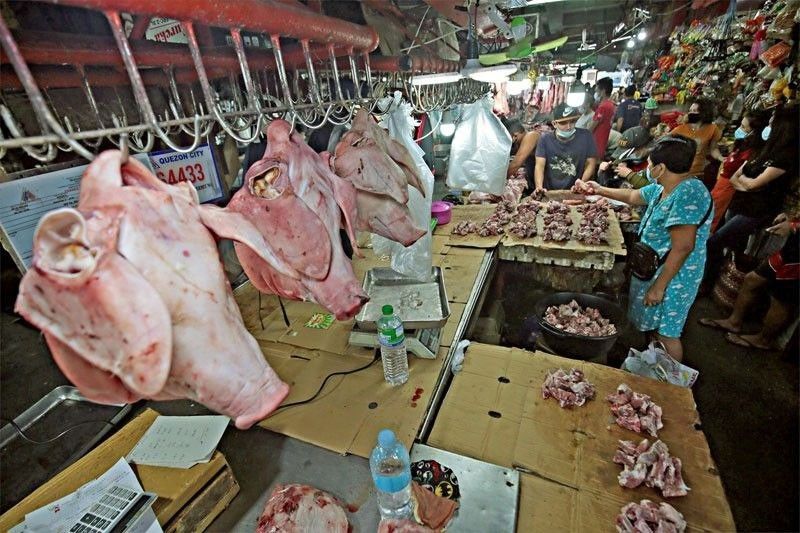Duterte stands by EO lowering pork tariffs

MANILA, Philippines — President Duterte stood by his decision to lower the tariff on pork imports, saying it is just a temporary measure to address rising prices.
Duterte said Executive Order (EO) 128, which reduced the tariff on imported pork, could be easily withdrawn if prices go down.
“I can understand where the senators come from. There is also the domestic supply which they intend to protect and they are vehement about it. The problem is, the managers of my departments believe that in the end, if the domestic market becomes stronger and there is movement, we can always withdraw the EO,” Duterte said in a pre-recorded public address on Monday.
Duterte assured the public that the executive branch implements measures that it thinks would benefit the people.
Under EO 128, the tariff rate for in-quota imports of fresh, chilled or frozen carcasses and half-carcasses, hams, shoulders and cuts and other products will be five percent for the first three months upon effectivity of the order, 10 percent for the 4th to 12th month and 30 percent after the 12th month.
The rates for out-quota pork imports will be 15 percent for the first three months, 20 percent for the 4th to 12th month and 40 percent after the 12th month.
The EO said the pork import tariff had to be lowered to address the existing pork supply shortage, stabilize prices of pork meat and minimize inflation.
Lawmakers opposed the order, saying it would flood the market with imported pork and kill the local hog industry.
Critics noted the reduced tariff would cost the government some P3.6 billion in foregone revenues.
Senate Minority Leader Franklin Drilon announced a plan to file a resolution to revoke the EO next month if Duterte does not reverse the policy.
Presidential spokesman Harry Roque said it would be up to Congress to decide whether to revoke the tariff adjustments.
“Once Congress resumes sessions, if they wish to override it, that is within the jurisdiction of Congress,” Roque said at a press briefing yesterday.
Agriculture Secretary William Dar insisted the government is not killing the local hog industry, saying the importation of pork would only fill the supply gap.
He said this year’s demand for pork based on the 15 kilos per capita consumption is 1.6 million metric tons, while the projected supply is about 1.2 million metric tons.
“So we will really lack supply this year because local food production shrank by 25 percent. We are not killing the local hog industry. We will import to address the supply lack for this year,” Dar said during a meeting with Duterte on Monday.
Dar said the government supports calibrated repopulation and intensified production in areas affected by the African swine fever (ASF) and the establishment of breeder multiplier farms to ensure adequate pork supply.
Acting Socioeconomic Planning Secretary Karl Chua said that food inflation rose to six percent in March from 2.7 percent last year, while meat inflation accelerated to 20 percent.
“What happened is like COVID on pigs. The spread (of ASF) was not controlled. And because of that, we incurred a huge deficit,” Chua said.
He said this year’s inflation accelerated to 4.2 percent, higher than the target range of two to four percent, but because of the lower pork import tariffs, it may ease to about 3.8 percent.
He said the aim is to lower pork prices from more than P300 per kilo to the “normal” price range of P215 to P222 per kilo.
Not yet
Drilon said the Department of Agriculture (DA) cannot raise the minimum access volume (MAV) on pork imports just yet as Congress needs to act on Duterte’s recommendation when session resumes next month.
He said in keeping with the spirit of Republic Act 8178 or the Agricultural Tariffication Act, Congress – which has the power to set import quotas – should be given the chance to act on Duterte’s proposal to raise the MAV to at least 350,000 metric tons (MT) on pork.
“To implement it without waiting for Congress to resume session and deliberate on the proposal is illegal, not to mention it is a total disrespect to a co-equal branch,” Drilon said in a statement.
Senators viewed with suspicion Duterte’s move to formally recommend to Congress to raise the MAV from the current 54,000 MT on March 26, or when lawmakers were no longer in session.
Congress will resume session on May 17.
Section 6 of RA 8178 provides that the President’s recommendation to revise, modify or adjust the MAV in case of shortages or abnormal price increases in agricultural products is deemed approved if Congress fails to act after 15 days from receipt of the proposal.
During the hearing of the committee of the whole last week, Lacson found it absurd that the policy, which will flood the market with imported pork, would not be a product of deliberations by members of the two Houses of Congress, but rather a result of devious machinations by those who want to trespass and usurp the power to legislate.
Drilon said the provision is not applicable in this case as the recommendation was sent to and received by the Senate when it was no longer in session.
Since Congress received the letter when it was on a break, the Senate and the House can only deliberate on the proposal once the session resumes, he said.
Drilon said the 15-day provision of the law only applies when Congress is in session.
“We provided a procedural framework, through Agricultural Tariffication Act, under which the fixing of MAV can be exercised by the President. The Executive must follow such procedures faithfully,” he said.
Senators noted that as early as January, Dar was already suggesting raising the MAV, but only to 150,000 MT, and there were no major supervening events from then until March that warranted a 350,000 MT import volume.
It also meant there was more than ample time to ask Congress to raise the MAV, they said.
Drilon warned that it might be “too late” if the President waits for the domestic market to become stronger before he withdraws the EO that lowers the tariff on pork products as the local hog industry might be dead when that happens.
Meanwhile, at least 150 ASF-infected hogs were culled in Pamplona, Cagayan on Monday.
The provincial veterinary office said the swine were within the 100-meter radius from Barangay Sta. Cruz, where 24 hog raisers were affected with the virus.
Affected hog raisers will receive compensation packages from the government. – Paolo Romero, Raymund Catindig
- Latest
- Trending




























